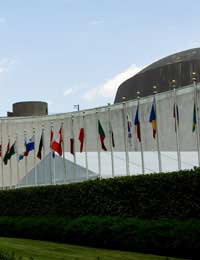How Human Rights Are Defended

Human rights are those rights which are attributed to human beings simply because they are human beings. These rights are acknowledged worldwide, and therefore can be considered to be universal (shared by all people regardless of age, race, sex, religion, location, or any other factor). The rights to life, free speech, freedom of religion/worship, freedom from torture or inhumane treatment, education and work, an adequate standard of living and housing, fair trials and the ability to participate in social, cultural and political activities are all considered basic human rights. Human rights are protected and defended in a variety of way, including through international treaties and legislation, in courts and by watchdog organisations.
Protecting Human Rights
Human rights are protected by a variety of international treaties as well as through specific national laws. The foundation of most international human rights law is the Universal Declaration of Human Rights (UDHR) which was passed unanimously by the United Nations in December, 1948. This document was reaffirmed, again unanimously, at the Vienna World Conference on Human Rights in 1993.In addition to the UDHR, the United Nations also works a treaty system on human rights which includes seven other treaties: the Convention on the Elimination of all Forms of Racial Discrimination (1969), the International Covenant on Civil and Political Rights (1976), the International Covenant on Economic, Social and Cultural Rights (1976), the Convention on the Elimination of All Forms of Discrimination Against Women (1981), the Convention Against Torture, and Other Cruel, Inhuman or Degrading Treatment or Punishment (1987), the Convention on the Rights of the Child (1990), and the International Convention on the Protection of the Rights of All Migrant Workers and Members of Their Families (2003). In Europe, the European Convention on Human Rights (ECHR) was adopted by the Council of Europe in 1950.
Most countries also have specific legislation which protects the human rights of its citizens. In the United Kingdom, the Human Rights Act of 1998 was adopted to reinforce the UK's commitment to human rights and is in force in England, Wales and Northern Ireland. The Scotland Act 1998 also guarantees that the Scottish Executive and Scottish Parliament can not do anything contrary to the European Convention on Human Rights.


Re: Questionnaire: Experienced Discrimination School?
Good day! I am Reynalyn Joy A. Taylo, currently our research paper for Grade 12 as a HUMSS student.…
Re: Questionnaire: Experienced Discrimination School?
Good day! I am Reynalyn Joy A. Taylo, currently our research paper for Grade 12 as a HUMSS student.…
Re: Questionnaire: Experienced Discrimination School?
Hello, can we use your questionnaire for our research?
Re: High Profile Discrimination Cases
I work for a car rental company. I was sent to a airport to pick a vehicle up to bring back to my job site. I was stopped at…
Re: Questionnaire: Experienced Discrimination School?
Hello! Can we use these survey questions for our project?
Re: Questionnaire: Experienced Discrimination School?
Hello, can we are asking for your permission to use your questionnaire for our research? Thanks!
Re: Questionnaire: Experienced Discrimination School?
We are asking for your permission if we could copy some of your questionnaire for our research ?? Thank…
Re: Questionnaire: Experienced Discrimination School?
hello Good morning my name is Mico john Hernander 17 years old from manila. Im so happy to make comment…
Re: Your Rights in the Workplace
Senior management.. often scream and shout at the team. Things not investigated before the blame game starts. Staff behaviours…
Re: Your Rights in the Workplace
I work at M&S Distribution Centre in the East Midlands and only started working there since the beginning of May 2019, previously…